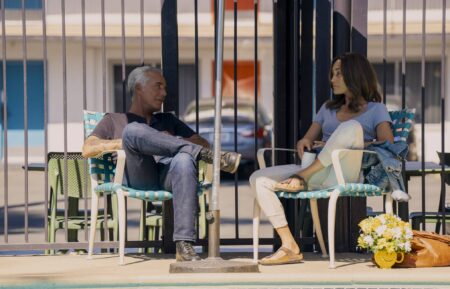‘Fear TWD’: Keith Carradine and Jenna Elfman on the Dynamic Between John Dorie Sr. & June
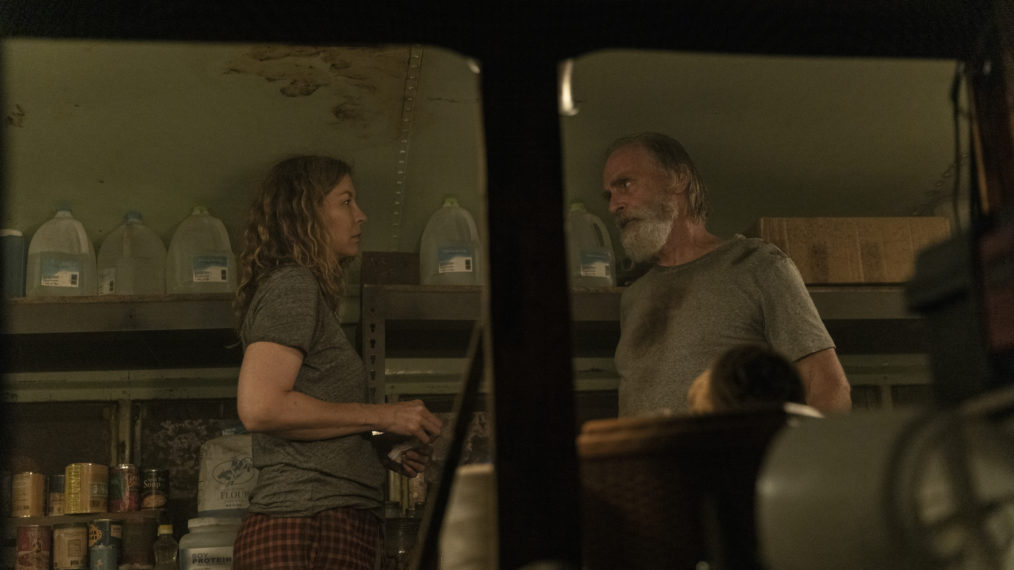
Spoiler Alert
[WARNING: The following contains MAJOR spoilers for AMC’s Fear the Walking Dead Season 7, Episode 3, “Cindy Hawkins.”]
Plenty of people shudder at the thought of getting together with their in-laws around the holidays, let alone the possibility of being stuck in a bunker with them during the nuclear zombie apocalypse. (The horror!) And yet, for June (Jenna Elfman) and John Dorie, Sr. (Keith Carradine), that’s exactly what happens in Season 7 — and as Elfman says, there’s no room for “neuroses” when the sole goal is survival.
We chatted with Elfman and Carradine about what that bunker set was really like, if John had ulterior motives for continuing his search for Cindy (Brittany Bradford), how June went from shooting Virginia (Zoe Colletti) to lying to her father-in-law, and their differing opinions when it comes to staying in the new compound lead by a former friend, Victor Strand (Colman Domingo).
What was it like filming in that bunker set?
Jenna Elfman: I met with the production designer, Bernardo Trujillo, to have him walk me through it. I wanted to spend some time in there because my character has been living in it. He discussed the process of building it, and it was inspired by a real bunker made out of school buses that exists in the world. It was very realistic; we were actually in the school buses. There wasn’t a big open section where the crew was coming in and coming out. We had to go through the school bus door to go out of the set, basically. It was extremely realistic, very claustrophobic. Hot, stuffy, but so incredibly designed. It is extraordinary, what Bernardo did.
It was very interesting to watch the director of photography light it, and what he used weren’t normal things—they had these little orange-ish lights that were magnetized, so he could use what he needed to keep it very low light. It had that spooky, eerie quality that mirrored the outside world, with that golden pigment. It was just as destructive and sad inside as it was outside.
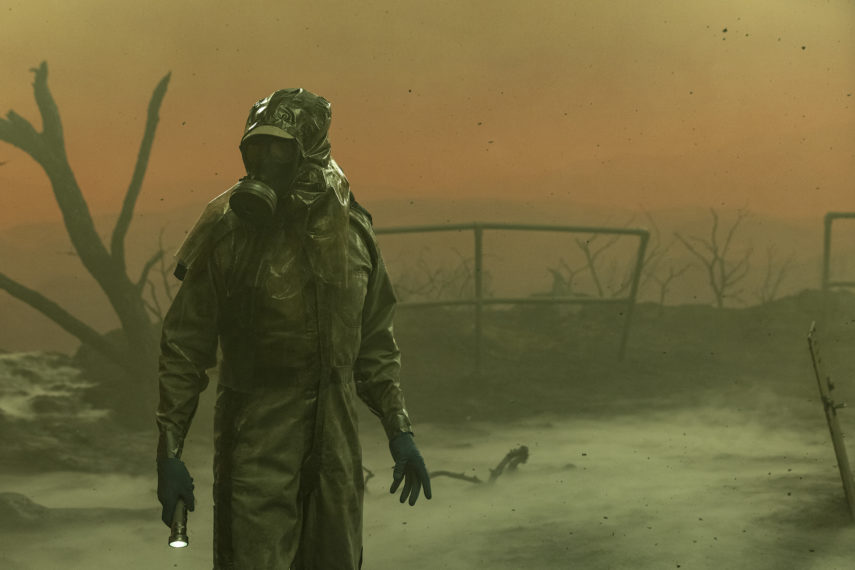
Lauren “Lo” Smith/AMC
Talk to me about the relationship between John and June. I really love their dynamic. What does he like about her?
Keith Carradine: I think John recognizes June’s humanity and that her life’s work has been as a healer. He cannot help but respond to the energy that she exudes. She looks to cure illness, injury, and perhaps even one’s psyche. I think John is desperately in need of healing, and when he finds himself in this circumstance with this extraordinary young woman — who happens to be his daughter-in-law — his own sense of survival taps into that. He recognizes that she can make a huge difference to him in his life, and in so doing, perhaps he can respond in kind and do something good for others, and for her in particular. And there’s the fact that it’s a connection to his son, and this is the woman that his son loved and who loved his son. That has very deep meaning for him.
What does June like about John?
Elfman: I think the string that connects her to John Dorie Sr. is seeing the qualities she came to know and love in John Jr., in him — these familiar traits, and sayings, and desire to help people know which way is up. That moral sense that John Dorie Jr. (Garret Dillahunt) had, she sees where he got some of that and it connects her to his heart, in a way. I think that’s the main thing because John Dorie Sr. has some of his own annoying qualities that have nothing to do with his son that make the in-law situation uncomfortable! But I don’t think that the in-law drama has the same level of neuroses that it does in our everyday life. There’s no room for neuroses when the stakes are that high, and you need each other. You don’t have the luxury of being neurotic. You have to help each other survive.
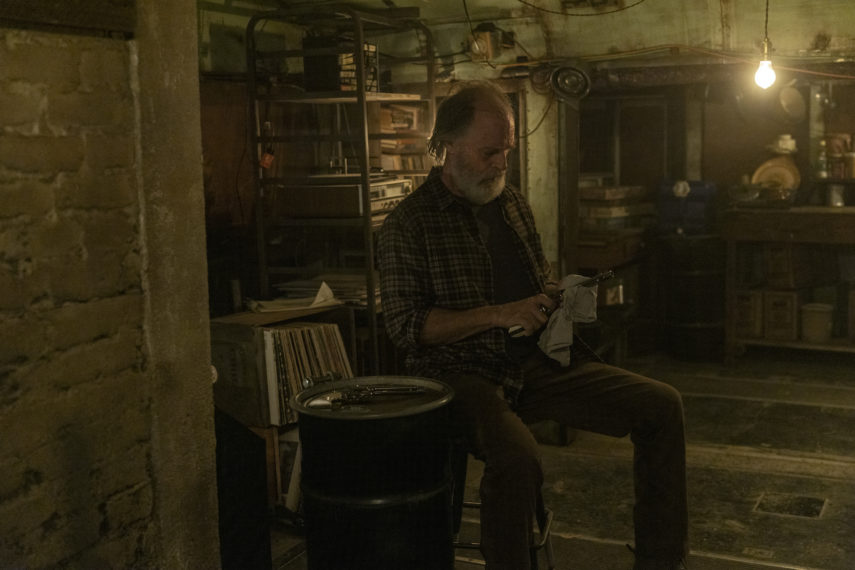
Lauren “Lo” Smith/AMC
Keith, you had some pretty intense moments this episode with those withdrawal scenes. There was a physicality to them that I thought you played really well. How did you approach that?
Carradine: All of us as actors have our own ways of doing things. People refer to “the method,” and I’m not a student of that, but I believe every actor has their own method of getting to what is the truth. Finding it in myself, whatever those sensations might be — I did some research into understanding what those symptoms are and what people who’ve experienced them remember about going through that process. I tried to imagine myself being in that place. It’s a wonderful thing, the imagination when you think about it — and especially the fact that we actors have chosen to find a way to spend our entire adult lives doing what comes naturally to children.
June surprised me in this episode several times. She surprised me when she lied about the days, and she surprised me when she wanted to stay with Strand. What changed in her, since last season?
Elfman: I have a couple of books written by survivors from Hiroshima and Nagasaki, and they talk about how much it changed them and what it did to them. I think that for us, it’s impossible to grasp the amount of destruction and death — and not just death, but seeing skin melt off the faces of one’s relatives. Many of them talked about how it changed them, it did something to them, they couldn’t even cry. It was just too much.
June doesn’t know if she and John are the last two people in this area who aren’t walkers, except for these weird people they’re hearing up above. And June’s Achilles heel is if she can’t help. If she doesn’t have anyone to help or she doesn’t know how to help, she starts feeling her demons. As soon as she can find an avenue to start serving or being of assistance or help, she finds her way and feels oriented. And this is right on the heels of having lost [her husband] John, and Teddy’s group was right on their heels, and straight into a nuke, and straight underground. I think it’s just too much.
Is that more ruthless streak we saw in June still there? Or did the nuclear apocalypse burn that away?
Elfman: No, I think that’s still there. I think that was a very defining moment that you can’t take away from her. That’s the fun thing about June that I love playing: No matter how many times she gets knocked down by her circumstances, she gets up stronger than she was before instead of more broken.
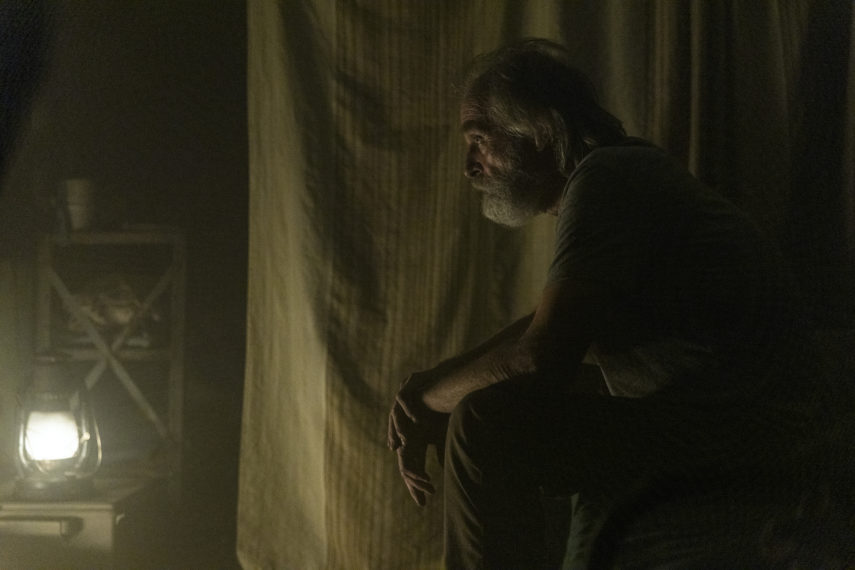
Lauren “Lo” Smith/AMC
I was surprised to hear John refer to Dakota as “another girl he couldn’t save,” especially considering she killed his son. Why wasn’t he angrier with her?
Carradine: John has gone through such an evolutionary process in terms of the responsibility he feels for the failures in his own life, and I think the grief has been so profound that it has taught him a little something about forgiveness. I think his more evolved grasp of that has led him to understand that even Dakota, for the terrible things she has done, there was something in her life that sent her in that direction and that he has compassion for that.
How much does June know about what went on between Strand and Morgan (Lennie James)?
Elfman: I think that there are things and conversations that happen off-camera, during scenes we don’t see. I think she might have a sense of it, yeah. When she arrives at Strand’s tower, there are a couple of things: First, she knows Strand, so there is a history. She is also happy to be out of that bunker, where it is safe, and where she can start figuring out which way is up for herself. She knows Strand is smart and will use her skills, so she has value there. It buys her some time to get her head on straight and figure out what the heck is going on.
John and Strand haven’t had very many interactions, and yet it seems like he knows instantly that he doesn’t want to stay in the tower. Why is that? What gut instinct is telling him, “This is not where I want to be?”
Carradine: Well, I can tell you as an actor working with another actor, when Colman walks in, there is a presence there. The choices he makes — he’s just brilliant. When Colman walks in dressed as he is, and with the energy that he has, all I had to do was respond to that in my character’s psyche and know that this guy is a bubble off — and [John doesn’t] think that this is a healthy place to be.
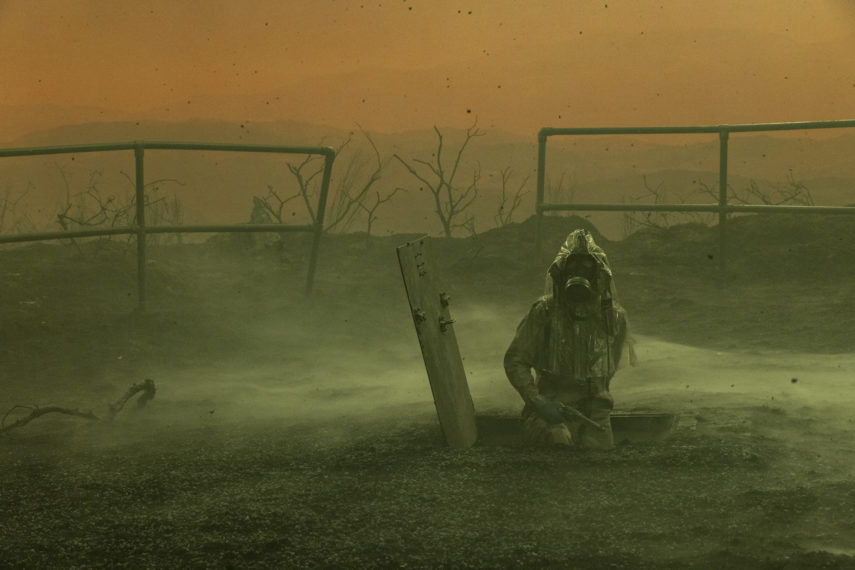
Lauren “Lo” Smith/AMC
Did John throw himself into that search for Cindy because he feels a need to keep his promise, or because he feels a need to keep working on something related to Teddy?
Carradine: I would say that it’s both of those things, together. The sense of futility in terms of what he is able to do now, that he was not able to do before, is profound. But at the same time, he needs an answer to that question that he was not able to get before. I think for his own sense of justice and trying to redeem himself for having broken the law to put Teddy away in the first place, he needs to find some sense of justification for having done that. So, I think his quest to unravel the mystery of Cindy is at the heart of that.
What can you say about June’s story for the rest of the season?
Elfman: Throughout the seasons we’ve watched her take on new abilities and new pieces of knowledge, whether it’s fishing or shooting guns or holding her own position on what needs to be done. I think we’re going to start to see the continued journey of her owning her own point of view.
Fear the Walking Dead, Sundays, 9/8c, AMC





